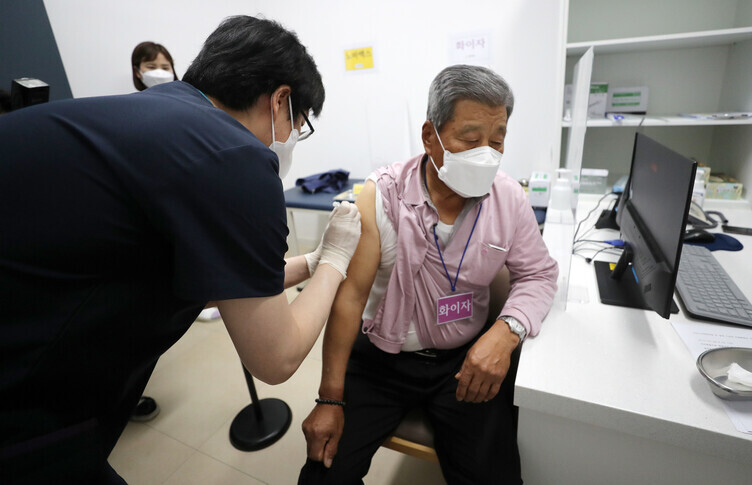hankyoreh
Links to other country sites 다른 나라 사이트 링크
When it comes to dose 4, which COVID-19 vaccine should you get and when?

Shin, a company employee in their 40s, was recently left wrestling with a dilemma when their 78-year-old mother visited a website to reserve her fourth dose of a COVID-19 vaccine.
The reason for their quandary was that the list of vaccines available included one produced by Novavax. Shin’s mother received the Pfizer vaccine for her first three doses, the last of them in November.
“My mother didn’t have any major side effects from the Pfizer vaccine, but I’d seen on the news that Novavax was more stable, so I wasn’t sure what to do,” Shin said.
“It looks as though she’s going to keep needing to get vaccinated repeatedly, and we still haven’t decided if she should continue getting the same vaccine or switch to Novavax, or when she should be getting it,” they added.
Administration of fourth vaccine doses began on April 14 for individuals aged 60 and over in South Korea, but many in this population are hesitant to get their shots, citing anxieties about vaccination and lack of information.
The government is recommending vaccination for older Koreans due to the dwindling effectiveness of the third dose in that population and the fact that around 90% of critical cases are occurring in the age group. But as of Thursday, the reservation rate for a fourth dose among South Koreans in their 60s and older was a low 13.8%.
For the fourth dose, disease control authorities are currently giving priority to mRNA vaccines such as those produced by Pfizer and Moderna, with Novavax as the next best option. Unlike the Pfizer or Moderna vaccines, the Novavax vaccine is produced with traditional genetic recombination methods.
“We’re recommending a fourth dose with an mRNA vaccine because it’s more effective,” said Kwon Geun-yong, director of the preventive vaccination management team at the Korea Disease Control and Prevention Agency.
“If people are hesitant about getting mRNA vaccines, it’s much better for them to get vaccinated than not, so they may also reserve a Novavax [dose],” he added.
Choi Won-suk, a professor of infectious disease at Korea University Ansan Hospital, said, “Clinical experience suggests that it is possible to mix vaccines, so Novavax is an option, but there’s no basis for recommending Novavax over mRNA vaccines.”
“The Novavax vaccine has the least amount of data available for it,” Choi added.
In contrast, Eom Joong-sik, a professor of infectious disease at Gachon University Gil Medical Center, said, “While there isn’t enough evidence yet, I’ve been recommending Novavax a lot for a fourth dose because few side effects have been reported.”
By Lim Jae-hee, staff reporter; Kwon Ji-dam, staff reporter; Jang Hyeon-eun, staff reporter
Please direct questions or comments to [english@hani.co.kr]

Editorial・opinion
![[Guest essay] Maybe Korea’s rapid population decline is an opportunity, not a crisis [Guest essay] Maybe Korea’s rapid population decline is an opportunity, not a crisis](https://flexible.img.hani.co.kr/flexible/normal/500/300/imgdb/original/2024/0430/9417144634983596.jpg) [Guest essay] Maybe Korea’s rapid population decline is an opportunity, not a crisis
[Guest essay] Maybe Korea’s rapid population decline is an opportunity, not a crisis![[Column] Can Yoon steer diplomacy with Russia, China back on track? [Column] Can Yoon steer diplomacy with Russia, China back on track?](https://flexible.img.hani.co.kr/flexible/normal/500/300/imgdb/original/2024/0430/1617144616798244.jpg) [Column] Can Yoon steer diplomacy with Russia, China back on track?
[Column] Can Yoon steer diplomacy with Russia, China back on track?- [Column] Season 2 of special prosecutor probe may be coming to Korea soon
- [Column] Park Geun-hye déjà vu in Yoon Suk-yeol
- [Editorial] New weight of N. Korea’s nuclear threats makes dialogue all the more urgent
- [Guest essay] The real reason Korea’s new right wants to dub Rhee a founding father
- [Column] ‘Choson’: Is it time we start referring to N. Korea in its own terms?
- [Editorial] Japan’s rewriting of history with Korea has gone too far
- [Column] The president’s questionable capacity for dialogue
- [Column] Are chaebol firms just pizza pies for families to divvy up as they please?
Most viewed articles
- 1First meeting between Yoon, Lee in 2 years ends without compromise or agreement
- 2Under conservative chief, Korea’s TRC brands teenage wartime massacre victims as traitors
- 3Months and months of overdue wages are pushing migrant workers in Korea into debt
- 4[Guest essay] Maybe Korea’s rapid population decline is an opportunity, not a crisis
- 5[Column] Can Yoon steer diplomacy with Russia, China back on track?
- 6‘We must say no’: Seoul defense chief on Korean, USFK involvement in hypothetical Taiwan crisis
- 7Dermatology, plastic surgery drove record medical tourism to Korea in 2023
- 8After election rout, Yoon’s left with 3 choices for dealing with the opposition
- 9Two factors that’ll decide if Korea’s economy keeps on its upward trend
- 10[Column] Behind factional animus of Korean politics, victim mentality festers